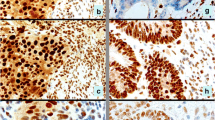Abstract
The replication error status analysis of DNA, through microsatellite instability detection, has become an indispensable tool for hereditary non-polyposis colorectal cancer screening. This study investigated the microsatellite instability in Brazilian individuals presenting colorectal cancer. In this study, 66 patients were clinically analyzed according to Amsterdam II and Bethesda guidelines. Normal and tumour tissues were collected and analyzed for MSI degree according to molecular markers BAT25, BAT26, BAT40, APC–D5S346, D2S123, and D17S250. Eight patients (12.1%) fulfilled the Amsterdam II guidelines, and 15 (22.7%) met the Bethesda guidelines. BAT25 was the most sensitive marker (86.7%), while BAT26 was the least sensitive (66.7%). The specificity of both markers was 100%, but all of the markers must be used since the contribution of each marker to the sensitivity and specificity of the test is complementary. Proximal tumours were significantly predominant among RER+ patients. Conclusions: Patients with a family history of colorectal cancer with the tumour in the proximal colon must be screened to replication error status as early as possible in order to avoid the progression of the disease.

Similar content being viewed by others
References
Rossi B, Nakagawa W, Ferreira F, Aguiar JS, Lopes A (2004) Câncer de cólon, reto e ânus, 1st edn. Lemar e Tecmedd, São Paulo
Lynch H, De La Chapelle A (2003) Hereditary colorectal cancer. N Engl J Med 348:919–932
Fearon E, Vogelstein B (1990) A genetic model for colorectal tumorigenesis. Cell 61:759–767
Aaltonen L, Peltomäki P, Leach F, Sistonen P, Pylkkänen L, Mecklin J et al (1993) Clues to the pathogenesis of familial colorectal cancer. Science 260:812–816
Thibodeau S, Bren G, Schaid D (1993) Microsatellite instability in cancer of the proximal colon. Science 260:816–819
Ionov Y, Peinado MA, Malkhosyan S, Shibata D, Perucho M (1993) Ubiquitous somatic mutations in simple repeated sequences reveal a new mechanism for colonic carcinogenesis. Nature 363:558–561
Papadopoulos N, Nicolaides NC, Wei YF, Ruben SM, Carter KC, Rosen CA et al (1994) Mutation of a mutL homolog in hereditary colon cancer. Science 262:1625–1629
Wheeler JM, Bodmer WF, Mortensen NJ (2000) DNA mismatch repair genes and colorectal cancer. Gut 47:148–153
Jass JR (1999) Towards a molecular classification of colorectal cancer. Int J Colorectal Dis 14:194–200
Bronner CE, Baker SM, Morrison PT, Warren G, Smith LG, Lescoe MK et al (1994) Mutation in the DNA mismatch repair gene homologue hMLH1 is associated with hereditary non-polyposis colon cancer. Nature 368:258–261
Thibodeau SN, French AJ, Cunningham JM, Tester D, Burgart LJ, Roche PC et al (1998) Microsatellite instability in colorectal cancer: different mutator phenotypes and the principal involvement of hMLH1. Cancer Res 58:1713–1718
Cunningham JM, Christensen ER, Tester DJ, Kim CY, Roche PC, Burgart LJ et al (1998) Hypermethylation of the hMLH1 promoter in colon cancer with microsatellite instability. Cancer Res 58:3455–3460
Umar A, Boland CR, Terdiman JP, Syngal S, de la Chapelle A, Rüschoff J et al (2004) Revised Bethesda guidelines for hereditary nonpolyposis colorectal cancer (Lynch syndrome) and microsatellite instability. J Natl Cancer Inst 96:261–268
Zhang L (2008) Immunohistochemistry versus microsatellite instability testing for screening colorectal cancer patients at risk for hereditary nonpolyposis colorectal cancer syndrome. Part II. The utility of microsatellite instability testing. J Mol Diagn 10:301–307
Giráldez MD, Castellví-Bel S, Balaguer F, Gonzalo V, Ocaña T, Castells A (2008) Lynch syndrome in colorectal cancer patients. Expert Rev Anticancer Ther 8:573–583
Mullis K, Faloona F (1987) Specific synthesis of DNA in vitro via polymerase-catalyzed chain reaction. Methods Enzymol 155:335–350
Saiki RK, Gelfand DH, Stoffel S, Scharf SJ, Higuchi R, Horn GT et al (1988) Primer-directed enzymatic amplification of DNA with a thermostable DNA polymerase. Science 239:487–491
Gryfe R, Kim H, Hsieh ET, Aronson MD, Holowaty EJ, Bull SB et al (2000) Tumor microsatellite instability and clinical outcome in young patients with colorectal cancer. N Engl J Med 342:69–77
Wright CM, Dent OF, Barker M, Newland RC, Chapuis PH, Bokey EL et al (2000) Prognostic significance of extensive microsatellite instability in sporadic clinicopathological stage C colorectal cancer. Br J Surg 87:1197–1202
Hamelin R, Chalastanis A, Colas C, El Bchiri J, Mercier D et al (2008) Clinical and molecular consequences of microsatellite instability in human cancers. Bull Cancer 95:121–132
Hemminki A, Mecklin JP, Järvinen H, Aaltonen LA, Joensuu H (2000) Microsatellite instability is a favourable prognostic indicator in patients with colorectal cancer receiving chemotherapy. Gastroenterology 119:921–928
Ribic CM, Sargent DJ, Moore MJ, Thibodeau SN, French AJ, Goldberg RM et al (2003) Tumor microsatellite-instability status as a predictor of benefit from fluorouracil-based adjuvant chemotherapy for colon cancer. N Engl J Med 349:247–257
Bouzourene H, Taminelli L, Chaubert P, Monnerat C, Seelentag W, Sandmeier D et al (2006) A cost-effective algorithm for hereditary non-polyposis colorectal cancer detection. Am J Clin Pathol 125(6):823–831
Manne SL, Chung DC, Weinberg DS, Vig HS, Catts Z, Cabral MK et al (2007) Knowledge and attitudes about microsatellite instability testing among high-risk individuals diagnosed with colorectal cancer. Cancer Epidemiol Biomarkers Prev 16:2110–2117
Syngal S, Fox EA, Eng C, Kolodner RD, Garber JE (2000) Sensitivity and specificity of clinical criteria for hereditary non-polyposis colorectal cancer associated mutations in MSH2 and MLH1. J Med Genet 37:641–645
Hampel H, Frankel WL, Martin E, Arnold M, Khanduja K, Kuebler P et al (2005) Screening for the Lynch syndrome (hereditary non-polyposis colorectal cancer). N Engl J Med 352:1851–1860
De La Chapelle A (2002) Microsatellite instability phenotype of tumors: genotyping or immunohistochemistry? The jury is still out (Editorial). J Clin Oncol 20:897–899
De La Chapelle A (2005) The incidence of Lynch syndrome. Fam Cancer 4:233–237
Wakefield CE, Meiser B, Homewood J, Ward R, O’Donnell S, Kirk J et al. (2008) Randomized trial of a decision aid for individuals considering genetic testing for hereditary nonpolyposis colorectal cancer risk. Cancer, 10 July
Author information
Authors and Affiliations
Corresponding author
Rights and permissions
About this article
Cite this article
Leite, S.M.O., Gomes, K.B., Pardini, V.C. et al. Assessment of microsatellite instability in colorectal cancer patients from Brazil. Mol Biol Rep 37, 375–380 (2010). https://doi.org/10.1007/s11033-009-9807-9
Received:
Accepted:
Published:
Issue Date:
DOI: https://doi.org/10.1007/s11033-009-9807-9




